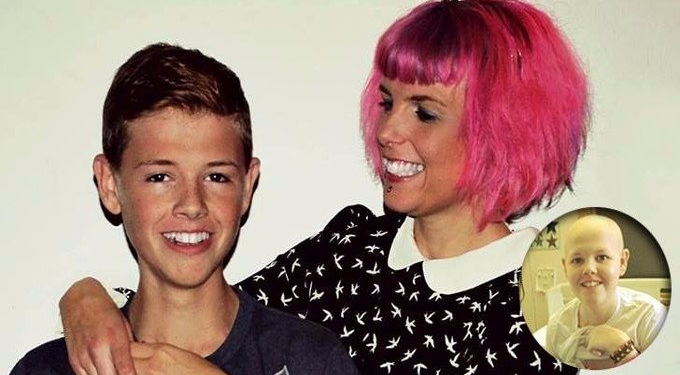
By Carey Wedler | The Anti-Media
(ANTIMEDIA) Both anecdotal evidence and clinical research are beginning to show the promise of cannabis in treating a variety of health issues. According to one family in the U.K., cannabis helped a dying teenage boy recover fully from complications from leukemia. The family recently appeared on the British talk show, This Morning, to discuss their experience.
Callie Blackwell’s son Deryn had been fighting leukemia followed by Langerhans cell sarcoma for four years — since the age of ten. Following doctors’ fourth and final attempt at a bone marrow transplant, they warned the family it was the last opportunity to save his life.
Though the surgery was successful, Deryn’s mother says he contracted an infection in the hospital. He grew extremely ill, and according to Callie, “He was literally being kept alive by antibiotics. That’s what they told us.” Doctors estimated he had three days to a week left to live following the turbulent aftermath of his transplant.
Deryn says he was ready to give up and had started planning his funeral. “After four years of treatment, it [was] enough,” he told This Morning.
In the meantime, however, his mother had been researching cannabis treatments. She says she kept hearing about it through word of mouth. However, because his cancer was technically already gone – he was succumbing to complications in the form of hand and stomach issues — she didn’t think it was a viable option.
Cannabis has recently been found, at least in preliminary laboratory testing, to shrink cancer cells. This early research is increasingly backed up by anecdotal evidence. Still, Callie didn’t think it applied and rejected cannabis as a potential treatment.
“The cancers [were] gone,” she said. “This [was] now a completely different issue. I would dismiss it and dismiss it.”
Nevertheless, Deryn remained sick and in hospice care, taking large doses of fentanyl, the strongest opiate painkiller on the market. He was still expected to die.
Callie asked doctors about Bedrocan, a cannabis-based pain relief product popular in Europe. “I wanted to go through the proper measures,” she said. However, she doctors told her it wasn’t an option because it hadn’t been approved for use in children.
That’s when she decided to obtain cannabis illegally and give it a chance. “He’s dying anyway,” she said.
Deryn, too, was open to the alternative treatment. “I was happy to [try it],” he said.
The New York Daily News explains that Deryn’s parents “met with a dealer to buy marijuana. They then found a recipe online that showed them how to turn it into a liquid form so they could give it to their teenage son.”
Callie clarified on This Morning that they did not use CBD (cannabidiol) or THC oil, the oils currently gaining popularity for treating everything from Parkinson’s disease to epilepsy to anxiety — and potentially cancer. Rather, they simply used a tincture.
“The effects of it blew my mind. It wasn’t what I expected,” she said.
Within half an hour to an hour, Deryn, who had been overcome with anxiety over his impending death, “was chilled out, just relaxed.”
Deryn’s condition improved not just emotionally, but physically. For example, when doctors removed bandages from his hands, expecting little to no progress, his fingers showed signs of recovery.
Further, doctors had warned that his white blood cell count would remain nonexistent, but after just five days of taking cannabis — 75 days after his final bone marrow transplant — they returned.
“All of a sudden his white count [had] appeared. Doctors were running around frantically” to do more testing, Callie said, though she added that at that time, Deryn’s white blood cell count was still very low.
To test the effectiveness of the tincture, Callie says she withdrew the treatment and the white blood cell count “started to go down again.”
Though Callie made it clear that she doesn’t endorse cannabis as a treatment that will cure cancer or work for everyone who tries it, she has no regrets about giving it to her son.
Experts are optimistic about the potential of cannabis, though they caution it is difficult to discern exactly what dynamic helped restore Deryn’s health, noting it could have been something entirely separate from cannabis that spurred his recovery. Further clinical research is needed to tease out exactly what alleviated his symptoms, as well as what causes such positive results in other patients who find success with cannabis.
As far as cancer is concerned, there is a great deal of uncertainty, as well as promise. “There have been lots of studies looking at the effect of cannabis on cells growing in the lab, but that’s been quite mixed, it seems to have had different effects on different types of cancer cells,” says Emma Smith, science information manager for Cancer Research U.K., as reported by the Independent.
For now, it remains illegal in the U.K., much of the United States, and many parts of the world. As one This Morning host interjected, “Anyone using the drug for any reason could be charged with possession.”
For Deryn’s parents, the risk was worth it. Deryn now aspires to open his own vegan restaurant. In his own words, he’s “Perfectly healthy. My white blood [cells] are all normal.”
















